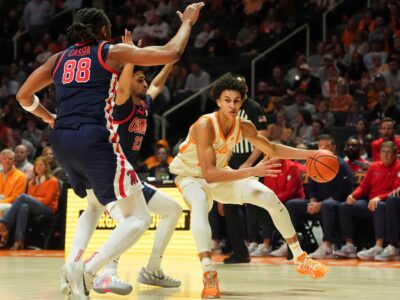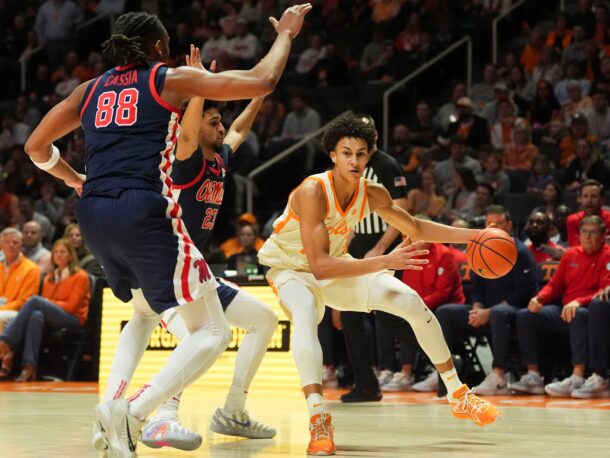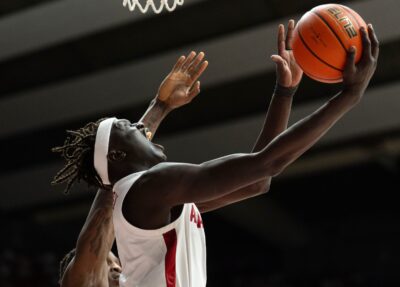
All college football fans should fear this potential scenario with the new College Sports Commission policing entity
By now, you know that the House settlement has changed college sports forever. Colleges can pay athletes directly now with a cap of $20.5 million for all athletes. The former athletes from 2016-24 will split a $2.8 billion sum in backpay, and blah, blah, blah.
While this is indeed a significant, landmark event in college sports — you could argue it’s now just professional sports being played at the collegiate level — it’s not a structural change to the overall fan experience.
There are, however, elements of this new structure that could have tentacles that extend to the fan experience.
And no, that wasn’t a reference to Tennessee charging an additional 10% “talent fee” to help the university finance this new era.
There’s a scenario that everyone (not just Tennessee fans) should fear. It’ll feel more like a pre-NIL era fear that should exist with the new policing entity, AKA The College Sports Commission (CSC).
If an NIL deal is more than $600, it has to be cleared by Deloitte to determine if it’s legitimate. If not, athletes could be ruled ineligible.
Call me crazy, but that sounds like a headache and a half. In this era, wherein there are players on 7-figure NIL deals that were constructed before the CSC came to fruition, that’s messy. Even if previous deals were grandfathered in, one has to wonder what “fair market value” will actually be if the market has already been set.
In the NIL/NCAA era, one could just play the Tennessee card. That is, countersue the NCAA for enforcing any sort of NIL-related violation … and win. The CSC was not created (it’s an actual LLC) to be the same entity that the NCAA was. The Power Conference commissioners started this to create real governance, which would be a stark contrast to the first half of the decade. This won’t be the NCAA picking and choosing spots in hopes that a fear of breaking rules will scare programs into following the rules that it admittedly was too overwhelmed and unorganized to enforce.
But it begs the question — what then is “fair market value” if a business is willing to pay an athlete that money? And what happens if Deloitte decides that an NIL deal doesn’t meet the criteria? As Yahoo’s Ross Dellenger reported, this won’t be nearly as drawn out as NCAA rulings were.
The “NIL Go” clearinghouse is using a fair market value algorithm to create “compensation ranges” for third-party deals.
Deloitte is expected to approve or disapprove deals in as little as one day, and athletes can resubmit rejected deals at least once with alterations suggested by the clearinghouse. For example, Deloitte may deem a submitted $100,000 deal between an athlete and third party to actually be valued at $50,000. The player can alter the deal to align with the clearinghouse’s suggested figure or the school can cover the difference by accepting a reduction against their revenue-pool cap.
If rejected a second time without those alterations, that would be left up to an arbitration process, according to Dellenger. Unlike the NCAA, which still has unresolved waivers, the CSC would have arbitration rulings in approximately 45 days. There’s some actual urgency if that timeline plays out, but still.
Add it all up and you can see what I’m getting at. A star quarterback could go into a week set to play in a big matchup, only to be told by the CSC that his deal isn’t in line with “fair market value” and that he needs to appeal or risk being ineligible. Will players know if their NIL deals are rejected by Deloitte? Better yet, will they be informed if the arbitration process is necessary?
In theory, no team should be caught off-guard by a player that loses an arbitration case. But that could be a looming cloud that hovers over a program if there’s nothing that they can do to alter an established NIL deal. Surely teams will try to bend their way around the system. But this is an enforcement agency that, if I had to guess, will try to make its presence felt.
That’s what CSC CEO Bryan Seeley was hired to do after spending more than a decade in MLB as its vice president of investigations and deputy general counsel:
What’ll be interesting to see is how that relationship evolves over time. If it’s just a new version of the NCAA, it’ll sour and college football will be considered a sport that’s too chaotic to govern. This is a reset.
But with a reset, challenges will likely come. This won’t be a relationship defined by whether a nose tackle making $850 was overpaid for his services. It’ll be defined by landmark punishments. And if landmark punishments aren’t had, you can bet that there’ll be some who cry foul and claim that certain schools are wiggling their way around the CSC.
Plus, how will transfers be policed? Won’t a previous school have an axe to grind and offer insight into what a former player could be getting with his new school? I suppose in an ideal world, that helps self-police extreme cases of tampering. In this world, it just seems like things are about to get messy.
It wasn’t long ago that Todd Gurley was suspended 4 games for accepting $3,000 to sign autographs. If you recall, he had an appeal that was rejected by the NCAA, who deemed that his violation was worth missing 1/3 of his pre-Draft 2014 season at Georgia. We’re now living in a world in which $3,000 in the NIL era is peanuts. That’s a rounding error. Is that type of violation still worth a 4-game suspension of one of the best players in the sport? Or does “fair market value” dictate something else? That’s what we’re all waiting to see.
We’re entering a time in which schools are now paying athletes directly, yet enforcement could be more by the book than it’s been compared to any previous iteration of the sport. That could mean irate fanbases. It could also mean teams are more buttoned up than they’ve ever been out of fear that the CSC will rule with an iron fist.
We could look back on the CSC as a “be careful what you wished for” situation when that first notable player is suspended over an NIL payment. Brace yourself for that when it inevitably happens and a fanbase is upset with a punishment to a star player. Maybe some can see the bigger picture and acknowledge that it’ll be for the greater good to actually have an enforcement entity that can, um … enforce?
If history is any indication, chaos awaits another new era of college football.
Connor O'Gara is the senior national columnist for Saturday Down South. He's a member of the Football Writers Association of America. After spending his entire life living in B1G country, he moved to the South in 2015.






